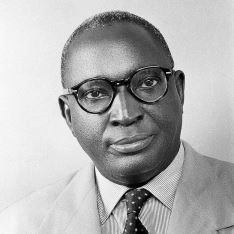
Sir Samuel Layinka Ayodeiji Manuwa attended King’s College, Lagos, Nigeria, before studying at the University of Edinburgh where he qualified MB in 1926. The following year he returned to Nigeria, joining the Colonial Medical Service. He worked there primarily as a surgeon and was greatly respected for his work, which included inventing an excision knife for tropical ulcers.
Manuwa completed his MD, awarded by the University of Edinburgh but studied for entirely independently, in 1934. His thesis was titled ‘Chronic splenomegaly in West Africa, with special reference to Nigeria: an enquiry into the observation on the common signs of this disease among West African negroes’. He won every prize which the medical school presented, including the Wellcome Prize in Medicine. His medical studies did not end there and Manuwa went on to study tropical diseases at the University of Liverpool.
He was approached numerous times during his medical work to take up administrative positions, which he declined – focusing instead on working directly with patients, which he continued for more than 18 years. Finally, in 1948, Manuwa accepted an administrative role as deputy director of medical services.
He subsequently was appointed Inspector-General of Medical Services, chief medical adviser to the Federal Government of Nigeria, member of the Privy Council of the Federation of Nigeria, President of the Association of Surgeons and Physicians in West Africa, public service commissioner and president of the World Federation for Mental Health.
Manuwa was elected to Fellowship of the Royal College of Physicians of Edinburgh in 1960 and received a knighthood for his contributions to medicine.



